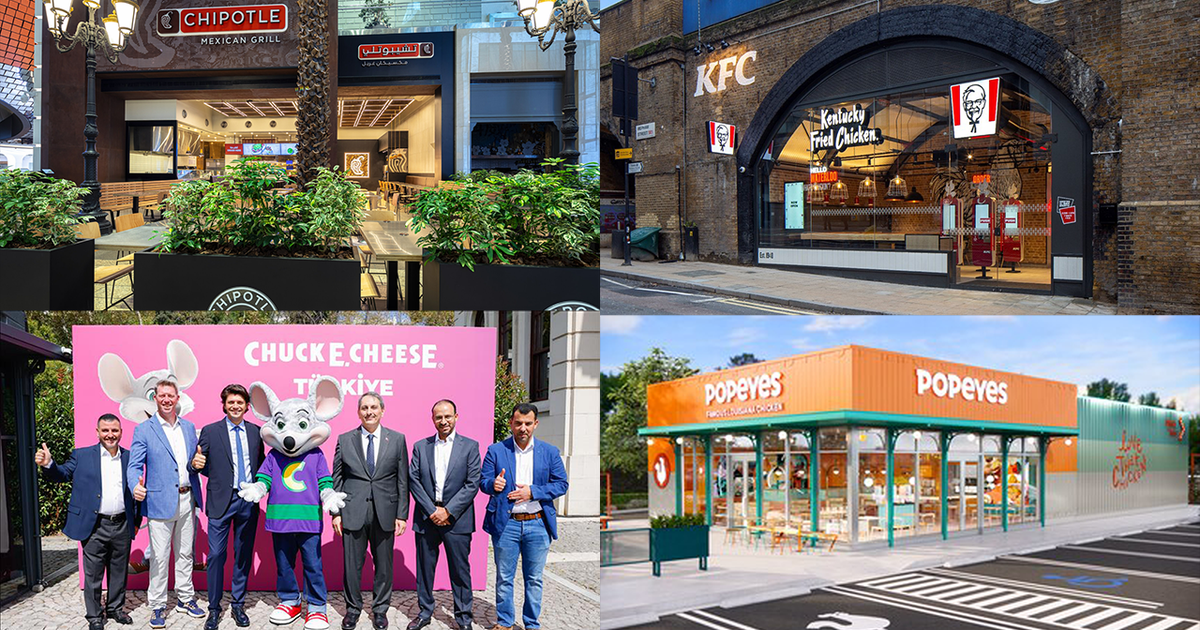Chipotle
To reach its goal of becoming an “iconic” global brand, Chipotle chief business development officer Nate Lawton said the company is focused on establishing a solid foundation so it can extend its growth runway “for decades to come.”
“Based on our progress in Canada, Europe, and the Middle East, we have a lot of confidence that our fresh, craveable culinary served fast will resonate around the world,” he said.
Chipotle has opened seven locations so far in the Middle East. Lawton said the Avenues Mall location in Kuwait and the Jumeirah Beach Residence location in Dubai have both surpassed the average unit volume in the U.S. in their first year, adding that younger consumers in the market are familiar with the brand from “global media and spending time in the U.S.”
Chipotle is also targeting South Korea and Singapore as both are experiencing fast-growing out-of-home dining trends.
“And consumers are highly familiar with American brands like Chipotle through education, travel, and social media conversations among relevant celebrities,” Lawton said. “Operationally, the dense urban footprints of major Korean cities and Singapore also make them very manageable markets to enter.”
Chipotle is bringing its full core menu to international markets while also respecting customs and restrictions of certain cultures. For example, the chain won’t serve carnitas in Middle East restaurants. Lawton said the chain’s menu is a differentiator as more brands expand into new global markets.
“Our focus on rice- and chicken-led formats, heavy vegetables, real ingredients, and health-forward options aligns with many international cuisine preferences,” he said. “We believe education around our real food prepared fresh every day can distinguish our brand from other concepts competing for guests around the globe.”
Chuck E. Cheese
Chuck E. Cheese has been franchising internationally since the 1980s, so international growth has always been a core part of its strategy. The company is focused on strategic geographic diversification with a particular focus on Europe and Asia.
Mario Centola, executive vice president and chief operating officer of international operations, said this plan is less about timing and more about opportunity.
“Many global markets remain underserved for our unique mix of safe, family-friendly entertainment, and we believe our strong intellectual property gives us a compelling advantage in meeting that need,” he said.
Chuck E. Cheese customizes its entertainment offerings and menu depending on market. Centola said such localization is one of the most important factors when entering a new region.
“We consider ourselves one of the most flexible franchise brands and we customize experiences, from our entertainment offerings to food items in the markets we serve,” Centola said.
Dave’s Hot Chicken
Dave’s Hot Chicken was founded in 2017 and is a relative newcomer to the industry. That’s not stopping the chain from targeting an international presence, however, with expansion in Europe and the Middle East planned or underway. Chief development officer Carolyne Canady said Dave’s it at a point where it is “both operationally strong and culturally relevant enough to scale globally.”
“After building consistency, culture, and craveability across hundreds of U.S. locations, we now have the foundation and systems to grow internationally with confidence,” she said.
The chain’s international expansion began organically, she added, with operators approaching the company first.
“Global appetite and awareness are already proven in markets like the U.K., Canada, and the Middle East,” Canady said. “Our international growth is the natural next step in our broader growth story. Expanding globally is about continuing the brand’s momentum and leveraging our operational strength through strategic partnerships abroad.”
Having proven success in its international markets, Dave’s is now turning its attention to Asia and Mexico, where the chain is having discussions with “several strong potential operators.”
“Our strategy has always been simple — go where we can team up with great operators,” Canady said.
Wingstop
In recent quarters, Wingstop has shared its intention of adding thousands of international locations as part of its long-term growth plan and its goal of becoming a top 10 global restaurant brand. Wingstop’s president of international Raj Kapoor said demand for the brand’s chicken wings continues to grow worldwide, with “fans flooding social media asking us to open in their cities.” Such demand brought Wingstop to markets such as Kuwait, Australia, the Netherlands, and Bahrain this year, while new restaurant openings in markets like the U.K. and Kuwait have been “shattering records,” Kapoor said.
Wingstop now operates across 16 markets, with Ireland and Thailand set to launch next, almost doubling its global footprint in the past three years. Kapoor said the brand is well positioned to compete globally because it is a category of one.
“As The Flavor Experts, we expand internationally by balancing global consistency with local relevance,” Kapoor said. “We make thoughtful localizations — whether that’s introducing a regionally inspired flavor (like Honey Garlic in Canada) or adapting to local spice preferences, like Inferno in Asia — to ensure we connect authentically with local tastes. Our amazing, craveable food and a business model is built to scale.”









